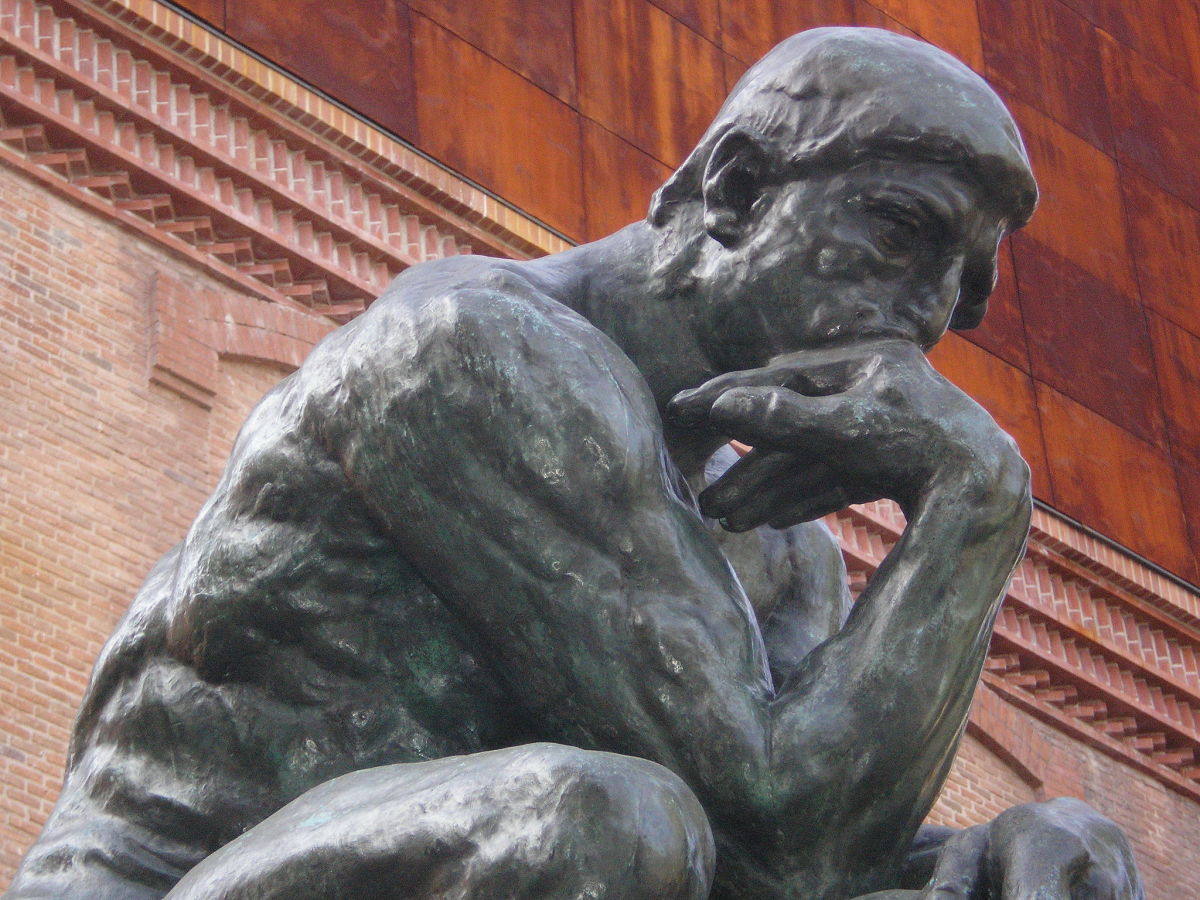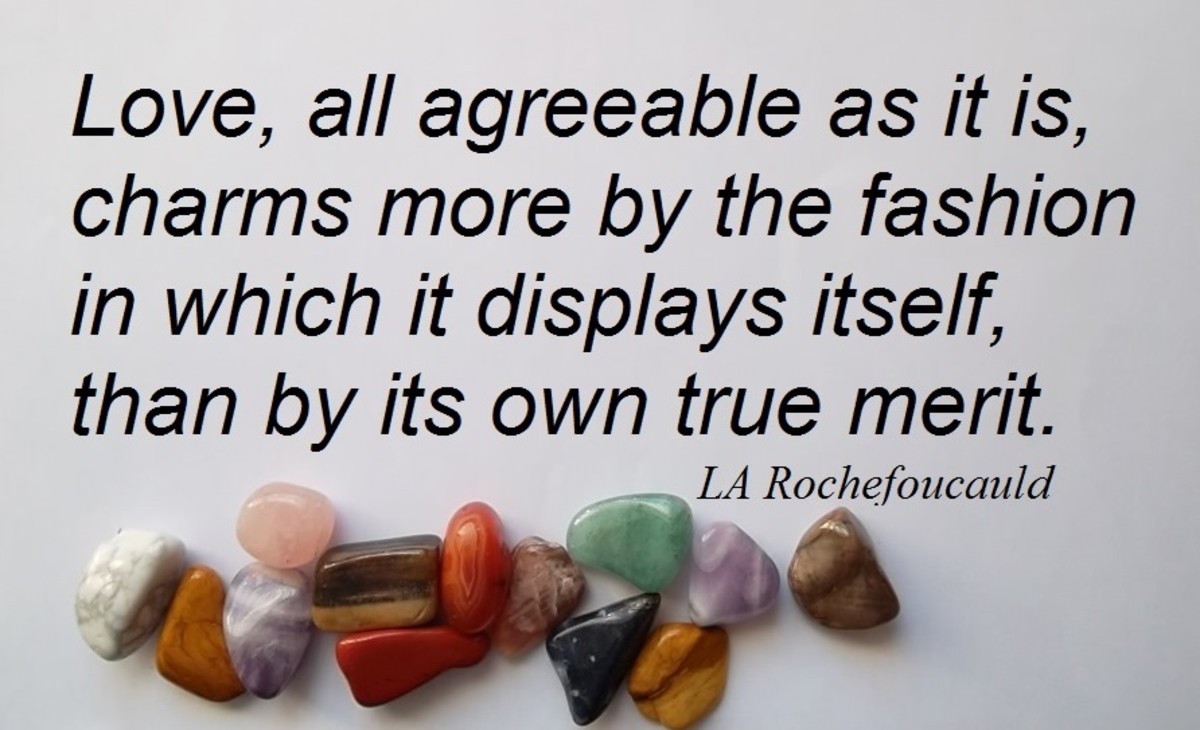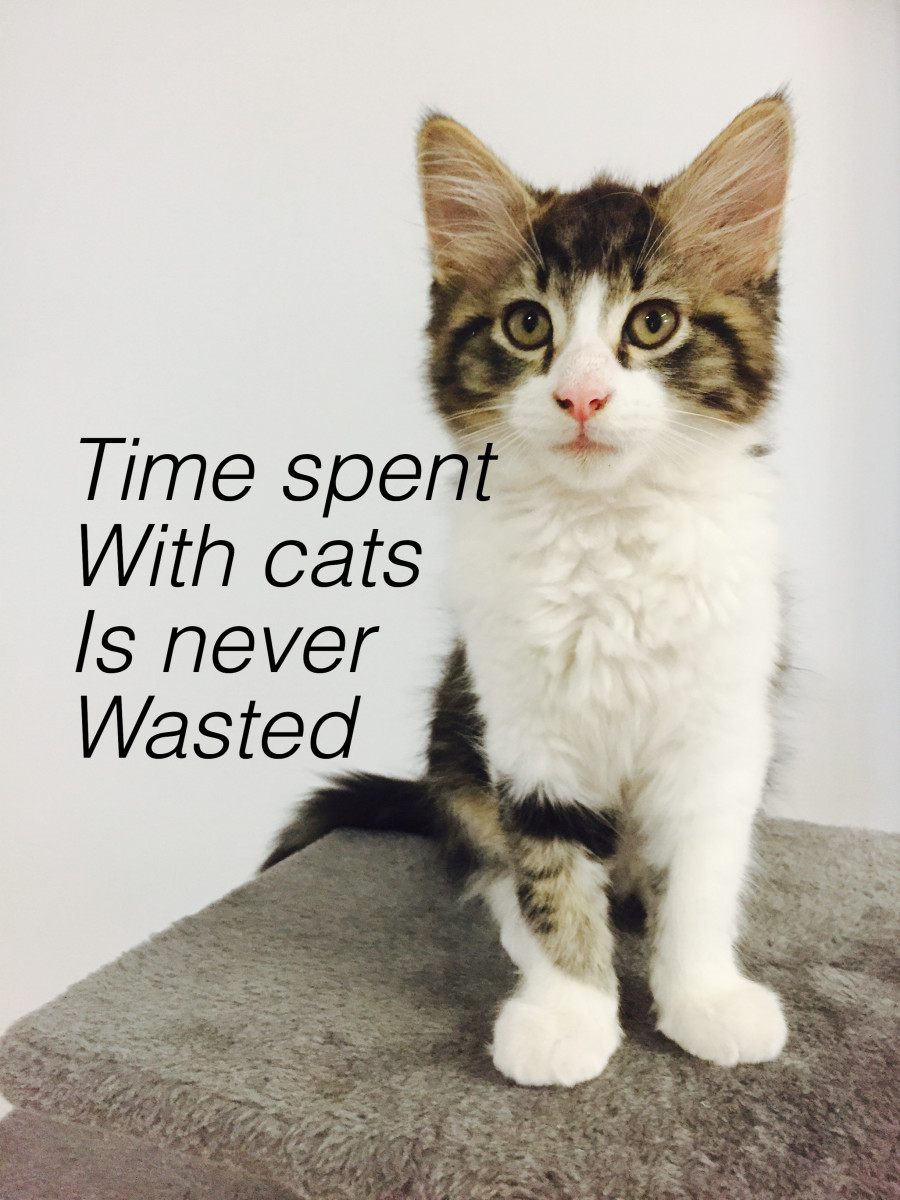Quotations for Motivation #48 --- Self-Pity
Quotations on Self-Pity
No matter how badly things are going with you, no mater how black the future may seem, don't pity yourself. To do so would be to make one of the worst mistakes you could possibly make.
Once you begin to pity yourself you are likely always to have cause to pity yourself. That is the peculiar danger of self-pity. Like a vampire that sucks the life energy out of the man who allows it to take possession of him.
Consider these facts:
Repeated experiments have proved that when a man's mind is filled with distressing ideas, every organ in his body slows down. His muscles lose their tone. The blood circulates less freely and less richly throughout his entire organism, including his brain.
That is to say, distressing ideas make it difficult for him to think vigorously or to act vigorously. Unless he is happy, or at all events in a not miserable mood, both his mental and his physical efficiency are sure to be far below what they ought to be.
Besides which, no man can be mentally or physically efficient unless he is able to concentrate his thoughts on the work he has to do. The self-pitier is not able to do this.
He is unable to do it because his attention is perforce kept fixed, not on his work, but on himself. To make matters worse, his attention is fixed on himself in a way that is the reverse of pleasurable.
His whole inner atmosphere is full of gloom. He eats and sleeps, works and plays, in a state of never-ending melancholy.
Hence, the man who pities himself is a man whose vital processes are preeminently sluggish. It could not be otherwise, in view of the known physical effects of depressing mental states.
Is such a man likely to escape being continuously unfortunate? To be fortunate in life, to win the success and happiness all men crave, powerful thinking and energetic doing are indispensable. These the self-pitier cannot possess. He is perpetually generating weakness, not strength.
Now you understand, do you not, the fatal error of self-pity?
If misfortune has been dogging your steps, let others pity you as much as they please. But never for a moment pity yourself. ...
Resolution, confidence, courage–the qualities that wrest victory from defeat--double a man's energy and help him to win the good fortune he deserves.
—H. Addington Bruce, Houston Daily Post, Houston, Texas, Feb. 4, 1917.
Remember that self-pity breeds weakness. It steals your self-reliance. Every failure and every adversity you meet brings you a wonderful opportunity to test your own moral courage. You become a stronger person because of it.
—Napoleon Hill, Houston Post, Houston, Texas, Nov. 21, 1956.
Self-pity is the act of feeling sorry for yourself. You sit down and weep because you are not appreciated, or loved, or worshipped as you feel you should be.
Not being appreciated, you cast about for reasons. It is only a step to find them. You are hated--folks are plotting against you.
When you pity yourself you begin to think of yourself as the center of creation, a sort of central sun around which the stars revolve--or should. You are out of focus.
Unconsciously, the self-pity habit brings indifference, then pity, then contempt of everybody with whom the individual associates.
We would better take the bumps that life sends and regard them as lessons. Life is a struggle against our own limitations. If we pity anyone, let's pity the folks who have to live with us.
It's a great privilege to live, to engage in the struggle of existence, to fight for that which is right, and if need be to suffer and die for it.
To have pain is proof that you are alive. Dead ones have no pain. Those who are alive are bound to suffer. This is part of the great education of every individual who really lives and achieves. And to live, in itself, is an achievement. ...
Self-pity is the first symptom of paranoia. And paranoia is a disease of the brain that comes from continually thinking of one's own self and dwelling on slights and fancied results.
If we fail in an understanding we blame others. If we succeed we take all the credit to ourselves. It is very much easier to blame someone else than to face the issue; and so we hide our blunders behind an excuse, evolve self-pity, explain the matter to anyone who will listen, to get them, if possible, to help feel sorry for us.
Self-pity evolves hypocrites who pretend that they feel sorry for us, when the fact is that, down deep in their hearts, they think less of us for every whine, every grouch, and every growl.
When we explain, when we accuse, when we denounce others, self-pity begins to consume us, and power takes wing. ...
Don't bewail unkind fate. Don't try to lay the blame on others.
Time is the great adjustor of all wrongs, and in the course of even a short lifetime we get all the love that is due us. That is to say, we get all that we give.
Is hate my portion just now? Bless me, when did I pass that out?
Life is a shooting of the chutes. Take your bumps, and don't whine. There are quiet and safety, and rest and silence, down at the bottom where we are headed for, and there will be plenty of time to enjoy them, too. But just now there is work to do.
Let's be grateful that we are alive.
—Elbert Hubbard, Cosmopolitan, New York, N.Y., July 1912.
There is something in every manly man which despises [the] self-deprecating spirit, this false self-effacement, this creeping, cringing, apologizing attitude, which robs one of all dignity and power.
If you approach people as if you expected a kick, you are pretty sure to get it. It may come in the form of a gruff refusal, of a snub, or of a polite invitation to get out, but you are likely to get what you invite, a rebuff. If you approach a man, do it in a brave, vigorous, manly way. Do not ruin your cause by giving him a contemptible picture of you at the very outset. At least let him see that you are self-respecting, manly, that there is nothing of the coward in you. ...
Your introduction is an entering wedge, your first chance to score a point. If you present a pleasing picture as you enter you will score a strong point. Here is where you must choose the golden mean between cringing and overboldness. ... If there is any evidence of dissipation in your appearance; if you swagger or show any lack of respect, all these things will count against you.
To sum up, your attitude, the spirit you radiate, your personality will have everything to do with your salesmanship.
—Orison Swett Marden, The Chicago Daily News, Chicago, Ill., April 23, 1920.
The idle mind is provincial. It stays at home. It finds little of interest in the world save itself and the body it inhabits. The idler thinks of himself. Self is his hobby, his vocation, his pet and his burden, and since all persons have something less than they desire, it follows that the self-centered man discovers causes of grievance. Let it be the impudence of a waiter, the state of the weather, approaching baldness or a persistent corn. No matter. Beginning with the assumption that the universe centers in his person he will magnify his grievance until he generates sufficient self-pity to feel a martyr. Once established in his martyrdom, he withdraws somewhat from the world of men and lives in the plaintive atmosphere where the ego fattens for the benefit of nerve specialists.
The man who is beaten may retire from the contest to regain his strength and return to conquer. The man who finds the blows too heavy may cry "Hold, enough!" and yet not lose the whole of his manhood. But he who quits to mend his wounds and washes them with tears of self-pity is no longer a man, but a thing. The door of hope has closed against him. He has fallen to the lowest depth man may know. He cannot come back; there is nothing to come back save the shell that once housed the spirit of a man.
—Robert Quillen, Saturday Evening Post, Philadelphia, Pa., May 8, 1920.
The persons who allow themselves to believe that some other persons, divisions of society or business organization is responsible for their lack of unbounded success is truly to be pitied. Men who go about preaching this doctrine and inspiring self-pity that they may profit by the general discontent are the worst enemies of civilization.
Every person is alone responsible for their own success or failure. Opportunities and conditions may afford an advantage at some time, but he who sits grumbling while they are in his reach is himself to blame if another whose mind is not distracted by fighting an imaginary foe reaps the benefit.
—J.E. Patten, The Searchlight, Hardin, Mt., Jan. 28, 1925.
The grouches, crabs and whiners create more unhappiness in life than the crooks. A lot of people who do their duty fairly well spoil the effect and add to the world's misery because they cry for credit–credit for doing what is only proper they should do and for which no one is entitled to particular praise. They whine because they are not appreciated. All they have done is what any self-respecting, upstanding man or woman is expected to do. They are constantly seeking sympathy. They are hunting for someone to lean against. When they are sick they love to talk about it. When they are well they won't admit it. They may be honest citizens, but they are not upright. They cannot stand alone.
—Grove H. Patterson, Milwaukee Sentinel, Milwaukee, Wis., Jan. 3, 1931.
One of the most deadly and disastrous attitudes a man can develop is that of self-pity. Next to fear, self-pity weakens more great ambitions, kills more noble dreams, and turns to flight more courageous onslaughts on the camps of wickedness than any other single foe.
There are those who will say: "If only I had the political pull," "if only my father would set me up in business too," "if only my uncle would leave me his medical office," "then I could be assured of success and security in the future also." Nothing ferments like self-pity, nothing ruins a personality more quickly. ...
For each of you, your contribution will not be measured so much by what others do for you as by what you do for yourself and others with your native equipment. Just accept yourself as you are, and make something of both your abilities and your liabilities.
—J. Richard Palmer, Five Smooth Stones, Salt Lake City, Utah, June 5, 1955.
Self-pity embraces in its sweep the inability to accept hard luck or unexpected trouble as part of the game. Self-pity curls one up in the face of misfortune. Self-pity means wasted time where you should be fighting all the harder to swing your luck into the proper channel, or to force yourself over fate's barricade.
—Grantland Rice, American Magazine, Springfield, Ohio, September 1920.
To begin extending pity to yourself is the sure herald of a coming slump. There are times when one may feel that the world is against him and that fate is upper cutting with both hands. The only comeback possible under this condition is renewed determination to get going again--and no renewed determination is possible with self-pity eating one's fiber away.
—Grantland Rice, New York Tribune, New York, N.Y., June 25, 1920.
Self-pity is the greatest dope in the world. ... Self-pity is insidious. You have to keep taking it in larger doses to get any kick out of it. For a while, your mourning may excite the sympathy of others. But your fellowmen can feel sorry for you only so long. After that, you bore and irritate them. All of us have adversity in plentiful doses. No one has a monopoly. If a man bends it and broods over it, he can soon build up a pretty good case that the stars in their courses are fighting against him. He increases his doses until a permanent quitter is born. And his story ends right there–save for some forlorn footnotes!
—Merle Crowell, American Magazine, Springfield, Ohio, August 1928.
Don't pity yourselves. The moment that a man begins to pity himself he loses stamina, he loses will power, he loses initiative, and unless he can master his self-pity, he is on the road and far along the road to a life of failure.
—J. Reuben Clark, Jr., Deseret News, Salt Lake City, Utah, June 18, 1952.
The first reaction to a difficulty is usually rebellion or self-pity. Most people try self-pity. “If I had the talent of another, if I could only get the breaks,” are some of the things we say to ourselves. A man must talk to himself more bravely and courageously than that, if he is to get anywhere.
—Frank Tripp, St. Joseph Gazette, St. Joseph, Mo., May 29, 1933.
Self-pity slays self-respect.
—B.C. Forbes, Forbes Magazine, New York, N.Y., May 15, 1928.
Self-pity causes more wrecks than misfortune.
—W.A. MacKenzie, The Leesburg Morning Commercial, Leesburg, Fla., March 2, 1927.
More men and women are spoiled by self-pity than by hard work.
—M.T. Maze, Reading Eagle, Reading, Pa., March 3, 1930.
To whine means to indulge in self-pity. This leads to personal deterioration. It insidiously weakens character. It robs of strength. Anybody who is persistently sorry for himself is in the twilight zone.
—Floyd Poe, Dallas Morning News, Dallas, Texas, March 31, 1952.
Self-pity is the most effective narcotic yet discovered. Like the drug habit, it grows on one.
—Hamilton G. Park, Salt Lake Tribune, Salt Lake City, Utah, June 12, 1946.
Time spent in pitying oneself is the worst kind of idleness.
—Earl Riney, Church Management, Cleveland, Ohio, October 1945.
Self-pity is the highway to self-destruction.
—William W. Seegmiller, Reflector, Denver, Colo., Jan. 15, 1940.
You will discover that the workers are too busy to spend time pitying themselves.
—Roy L. Smith, Tampa Morning Tribune, Tampa, Fla., May 4, 1932.
The best remedy for self-pity is responsibility.
—Roy L. Smith, Tampa Morning Tribune, Tampa, Fla., Nov. 15, 1935.
Only self-knowledge can free us from self-righteousness and self-pity. Self-examination is realism. The [man] who does not vibrate the thrill of knowing who he is may easily develop a martyr-complex and hide under a halo of intellectual haze. Self-inquiry [is] continually striv[ing] to relate our inner selves to a complex outer world. ... Once we understand who we are and where we have been we can better determine where we ought to go. Now listening to these words are the architects of tomorrow–You are so much more important than you think you are. Humility, certainly, but an arrogance about the cause to which we have dedicated ourselves. If we are on the side of right, it will win! If we are to be defeated, we must defeat ourselves. ... Our attitudes and values are the lenses through which we see and interpret our real world to others.
—John W. Harold, Midland Schools, Des Moines, Iowa, March 1961.
Truly there is no more demoralizing thing than the habit of berating one's self. How very often we find people who do this. They seem to derive the very keenest delight in telling how trivial is their worth in comparison with others.
This habit of self-depreciation is demoralizing to one's character, because it has a very tendency to destroy self-confidence, and once one's self-confidence has been destroyed there is no hope for independence of any sort.
There is about the person who feels the right amount of self-confidence a real poise and balance which nothing else gives, and one wonders why there should exist the type who seems to glory in the fact that it is really lacking in this most valuable asset.
Self-confidence, you know, is not conceit. Don't conflict the two, for they are not one and the same, as so many persons seem to believe.
We admire above all things the man, as well as the woman, who has the courage to be self-confident–who knows his virtues as well as his faults–and who wants credit for whatever he possesses that is worth possessing.
We admire above all things the man, as well as the woman, who has the courage to give free rein to his thoughts, who has the indomitable courage to live his own life as he feels he should.
One must believe absolutely in one's self. It means strength, and force and many other things which combine to make the full measure of a man or a woman, and to make it possible for one to achieve the goal of one's effort.
The majority of the folk who drift into the habit of self-depreciation do so because they are so filled with disgust over those who have placed too great a value upon their abilities, that is who have substituted that thing we call nerve and its partner, "cheek," for true ability, and, going to the other extreme, the disgusted one positively revels in a non-pretentious, humble air. But this leads to a weakness of character that shouldn't be encouraged. As we have already said, it is demoralizing.
Genuine self-respect and a good opinion of one's personality and true ability are wonderful weapons to wield against weakness, lack of confidence, and the other things which detract from one's progress, both in character making and that thing we call success.
Think well of yourself–if you are worth thinking well of–and others will think well of you.
—Harriot Russell, Houston Daily Post, Houston, Texas, March 15, 1916.
Don't feel sorry for yourself unless you want to get into a frame of mind which will as effectively shut you off from the things you desire as though you were to build about yourself a high wall.
Feeling sorry for yourself leads to selfishness and an indifference toward the rest of humanity, and a selfish woman or an indifferent woman is never going to find the lovely and most-to-be-desired paths in life; she is too engrossed in self to see or thing anything else.
The woman who feels sorry for herself gets up in the morning feeling that she is facing another dull, monotonous day, and because she feels as she does she is more than likely to find her day just the deadly, monotonous thing she expects it to be. We very nearly always find the thing for which we search.
Another woman begins her day saying to herself, "This is going to be a bright and interesting day--a successful day."
Perhaps it doesn't prove to be all that she anticipated and yet the hopefulness of her, the cheerful, eager attitude of her, toward the day insures a certain amount of interest. And the next day, or the next, or even the next may prove to be all that she desires.
The thing for which we search is the thing which, in the end, we will find whether it is monotony or dreariness or interest and success.
So quit feeling sorry for yourself–you gain nothing by it and you stand in a fair way to lose everything. Say to yourself, "I will find this an interesting day," and it is safe to say that before the sun slips down in the golden West some part at least of your day will have proven interesting.
—Harriot Russell, Houston Daily Post, Houston, Texas, Feb. 14, 1917.








